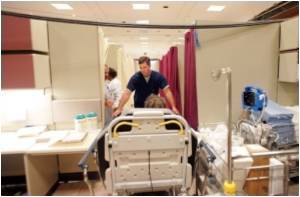US hospitals are putting on hold plans for renovation and reducing staff strength, possibly compromising on healthcare. All these because of declining profits on the back of declining premium payments.

“In uncertain economic times, it’s especially important to have certainty that hospitals are doing things safely. But as hospitals reduce staff and make other changes to make ends meet, we don’t necessarily have that certainty. That’s why it’s as important as ever to not only measure the quality of hospital care, but also understand the systems that do deliver consistent, cost-effective and high quality care.” says lead author Jeremy Sussman, M.D., M.S., an internal medicine physician and Robert Wood Johnson Foundation clinical scholar at the University of Michigan Health System.
During this recession, every source of income for hospitals is at risk. Almost three-fourths report receiving less reimbursement from insurance payers per discharge and over half report a decrease in patient admissions, according to the American Hospital Association’s report, “The Impact of the Economic Crisis on Health Services for Patients and Communities.” In addition, more than half of hospitals report difficulty obtaining bonds — an important source for paying for new construction or big-ticket equipment purchases — and charitable donations are down.
Though this is a difficult time for hospitals and many other organizations across the country, the authors say this is a critical time to improve monitoring of hospital quality. They encourage the federal government to increase public awareness of local medical needs, hospital financial stability and available patient services.
“We were surprised by how well hospitals have done during recessions in the last several decades and how, despite the economy in the last 12 months, relatively few hospitals are closing down. Instead, hospitals seem to be dealing with the economic crisis by reducing staff, scaling back or completely stopping new construction projects and implementing various efforts to improve efficiencies of care,” says Sussman.
“Our primary concern is that hospitals are making decisions to hold off on improvements in infrastructure and technology and cut staffing in ways that lead to a decrease in quality of care,” Sussman adds.
Advertisement
Sussman and his coauthors suggest the federal government should focus on connecting hospital safety with financial stability. For example, a hospital could receive government stimulus funds to employ nurse discharge advocates — who educate and prepare patients for discharge with instructions for medications and follow-up — to reduce rehospitalization. This program would preserve employment while advancing patient safety.
Advertisement
Source-Medindia








